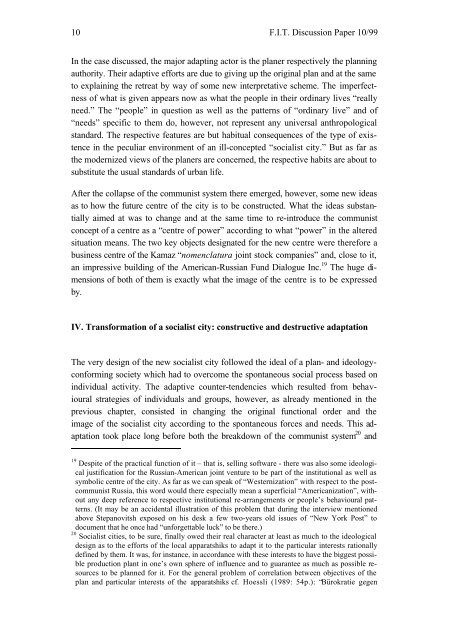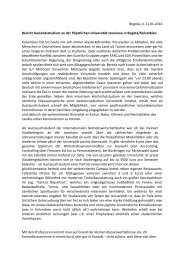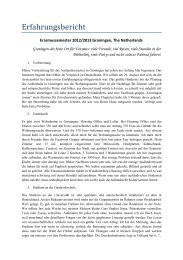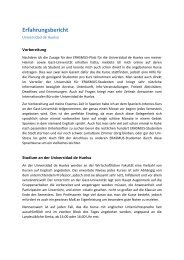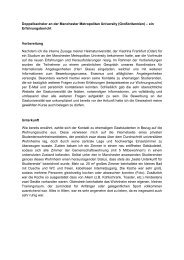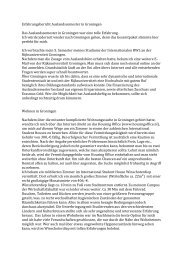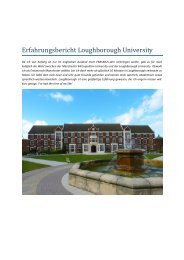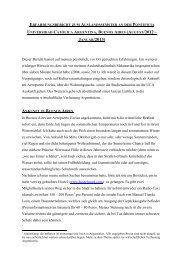Dariusz Aleksandrowicz Aleksandrowicz - Europa-Universität ...
Dariusz Aleksandrowicz Aleksandrowicz - Europa-Universität ...
Dariusz Aleksandrowicz Aleksandrowicz - Europa-Universität ...
Create successful ePaper yourself
Turn your PDF publications into a flip-book with our unique Google optimized e-Paper software.
10 F.I.T. Discussion Paper 10/99<br />
In the case discussed, the major adapting actor is the planer respectively the planning<br />
authority. Their adaptive efforts are due to giving up the original plan and at the same<br />
to explaining the retreat by way of some new interpretative scheme. The imperfectness<br />
of what is given appears now as what the people in their ordinary lives “really<br />
need.” The “people” in question as well as the patterns of “ordinary live” and of<br />
“needs” specific to them do, however, not represent any universal anthropological<br />
standard. The respective features are but habitual consequences of the type of existence<br />
in the peculiar environment of an ill-concepted “socialist city.” But as far as<br />
the modernized views of the planers are concerned, the respective habits are about to<br />
substitute the usual standards of urban life.<br />
After the collapse of the communist system there emerged, however, some new ideas<br />
as to how the future centre of the city is to be constructed. What the ideas substantially<br />
aimed at was to change and at the same time to re-introduce the communist<br />
concept of a centre as a “centre of power” according to what “power” in the altered<br />
situation means. The two key objects designated for the new centre were therefore a<br />
business centre of the Kamaz “nomenclatura joint stock companies” and, close to it,<br />
an impressive building of the American-Russian Fund Dialogue Inc. 19 The huge dimensions<br />
of both of them is exactly what the image of the centre is to be expressed<br />
by.<br />
IV. Transformation of a socialist city: constructive and destructive adaptation<br />
The very design of the new socialist city followed the ideal of a plan- and ideologyconforming<br />
society which had to overcome the spontaneous social process based on<br />
individual activity. The adaptive counter-tendencies which resulted from behavioural<br />
strategies of individuals and groups, however, as already mentioned in the<br />
previous chapter, consisted in changing the original functional order and the<br />
image of the socialist city according to the spontaneous forces and needs. This adaptation<br />
took place long before both the breakdown of the communist system 20 and<br />
19 Despite of the practical function of it – that is, selling software - there was also some ideological<br />
justification for the Russian-American joint venture to be part of the institutional as well as<br />
symbolic centre of the city. As far as we can speak of “Westernization” with respect to the postcommunist<br />
Russia, this word would there especially mean a superficial “Americanization”, without<br />
any deep reference to respective institutional re-arrangements or people’s behavioural patterns.<br />
(It may be an accidental illustration of this problem that during the interview mentioned<br />
above Stepanovitsh exposed on his desk a few two-years old issues of “New York Post” to<br />
document that he once had “unforgettable luck” to be there.)<br />
20 Socialist cities, to be sure, finally owed their real character at least as much to the ideological<br />
design as to the efforts of the local apparatshiks to adapt it to the particular interests rationally<br />
defined by them. It was, for instance, in accordance with these interests to have the biggest possible<br />
production plant in one’s own sphere of influence and to guarantee as much as possible resources<br />
to be planned for it. For the general problem of correlation between objectives of the<br />
plan and particular interests of the apparatshiks cf. Hoessli (1989: 54p.): “Bürokratie gegen


